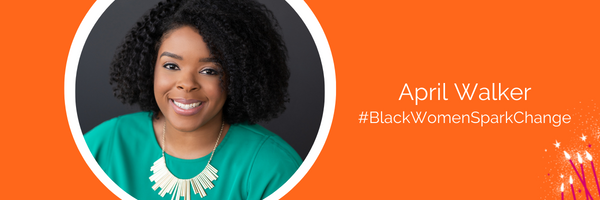
April Walker is a nonprofit consultant and founder of Philanthropy for the People, an organization dedicated to centering racial equity and justice in fundraising and grantmaking. In this role, April works with nonprofits, donors, and foundations to challenge biases and bring people with lived experiences to the forefront of the philanthropic conversation.
After spending years in philanthropy, April knew it was time to disrupt the fundraising field.
“I was previously in a Chief Development Officer role at a large workforce development organization in Cleveland, Ohio,” April shares. “And the reality is that I was the only Black leader of that organization. And it was a Black serving organization in a predominantly Black city that had been around for 130 years.”
During the pandemic, April realized the organization wasn’t focused on having tough conversations or unlearning biases. So she decided to create her own firm to help nonprofits confront power imbalances and embrace accountability.
Initially, April didn’t set out to work in philanthropy.
“The way I understood philanthropy was very much how it exists in the mainstream – whatever Gates did, whatever Zuckerberg does, whatever Oprah does,” she explains.
April studied sociology and social services administration in school and essentially fell into philanthropy work once she realized that there is much more to this work than being a billionaire donor.
“I was always curious about how we can take better care of communities and empower communities,” April shares.
Once she became entrenched in the fundraising world, she saw first-hand where changes needed to be made.
“It really wants to celebrate wealth. It doesn’t examine where wealth comes from,” April says. “It doesn’t examine the power imbalance that exists or the systems that perpetuate poverty.”
Since starting Philanthropy for the People in 2021, April has been able to help reform these parts of philanthropy and bring the voices of people with lived experiences to the table.
Bringing Her Personal Self to Her Professional World
In 2019, April attended a presentation by Dr. Tyrone Freeman that changed her life. Dr. Freeman is an award-winning scholar whose work focuses on Black women’s philanthropy during Jim Crow.
“I had gone eight years at that point with no one really inviting the Black community into the conversation, except to be the people who were being served,” she says.
April’s young nephew also motivates her to help create a more equitable world for the next generation.
“He is every ounce of little boy energy and Black boy joy,” she shares. “And I want there to be an actual platform and trajectory for his joy, for his passion, for his creativity in a world that is going to see him as a threat.”
Inspired by Dr. Freeman’s work and the love she feels for her nephew, April sees her works through the lens of “how can I shift the narrative?”
One way she does this is by shedding light on communities that have been giving generously without being acknowledged.
“The Black community is much more philanthropic in proportion to the resources that we have, and our generosity persists in spite of systemic racism and discrimination.” April says.
The Importance of Grace and Gratitude
To stay in the work, April encourages herself and her peers to prioritize mental health.
“Rest more, be kinder to yourself about what you need and build a tribe,” she offers.
Cultivating a strong community in the philanthropic world has been crucial to staying motivated.
“I don’t have to have any facades or perform here. I’m accepted for what I know to be true about my work and who I am as a person,” she explains.
April brings her full self to the work she does with Philanthropy for the People and ultimately being compassionate with herself and others is what helps her to stay focused on making important changes in this space.
“It’s important for people to know that equity is something you have to do more than just speak about,” she says. “There’s a lot of grace that’s required for yourself and for others in this work.
If I didn’t ground my work in grace and gratitude, I wouldn’t be able to do it.
